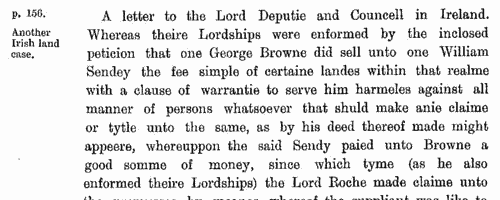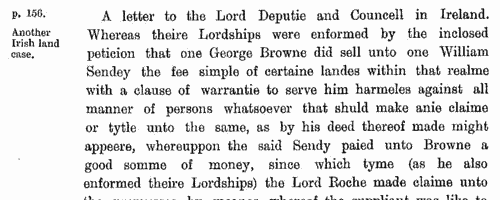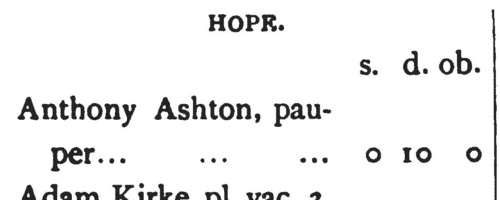Bockinge Surname Ancestry ResultsOur indexes 1000-1999 include entries for the spelling 'bockinge'. In the period you have requested, we have the following 8 records (displaying 1 to 8): Buy all | | | Get all 8 records to view, to save and print for £34.00 |
These sample scans are from the original record. You will get scans of the full pages or articles where the surname you searched for has been found. Your web browser may prevent the sample windows from opening; in this case please change your browser settings to allow pop-up windows from this site. Liberate Rolls
(1260-1267)
These chancery liberate rolls of the 45th to 51st years of the reign of Henry III of England record the details of payments and allowances as part of the administration of government. Most entries start with the Latin words 'liberate', meaning 'deliver', or 'allocate', meaning allow. There are also 'contrabreves', warrants mainly to sheriffs of shires, assigning them tasks and allowing expenses. Most of the entries relate to England and Wales, but there are occasional references to Ireland and the English possessions in France.BOCKINGE. Cost: £4.00.  | Sample scan, click to enlarge

| Inhabitants of London
(1275-1298)
Liber Horn or the Lesser Black Book, now known as Letter Book A of the City of London contains enrolments of recognizances between inhabitants, particularly citizens, for sums of money lent or due; grants of pieces of land or property; and various records relating to the city administration. The letter books are so called because they were lettered from A to Z and from AA to ZZ, not because they were books of letters. Letter Book A was edited by Reginald R. Sharpe for the corporation and printed in 1899.
BOCKINGE. Cost: £4.00.  | Sample scan, click to enlarge

| Tenants of Somerset chantries
(1548)
Chantries were established to perform services for the souls of their founders and other faithful dead, including annual obits and anniversaries at which alms were usually distributed. The chantries could be at an existing altar in a parish church, a new altar in a side chapel of an existing church, in a new chapel in the churchyard or some miles from an existing church: few were founded before 1300, and most date from 1450 to 1500. Hospitals were places provided by similar foundations to receive the poor and weak; there were also religious guilds, brotherhoods and fraternities, and colleges (like large chantries at which three or more secular priests lived in common). An Act of Parliament of 1545 gave king Henry VIII the power to dissolve such chantries, chapels, &c., the proceeds to be devoted to the expenses of the wars in France and Scotland. Commissioners were appointed 14 February 1546 to survey the chantries and seize their property, and in 1548 the commissioners in Somerset produced this survey and rental. The individuals named are the tenants whose rents provided the chantry's income: occasionally an incumbent is named. The survey was edited by Emanuel Green for the Somerset Record Society, and published in 1888.BOCKINGE. Cost: £4.00.  | Sample scan, click to enlarge

| Liegemen and Traitors, Pirates and Spies
(1591-1592)
The Privy Council of queen Elizabeth was responsible for internal security in England and Wales, and dealt with all manner of special and urgent matters
BOCKINGE. Cost: £4.00.  | Sample scan, click to enlarge

| Liegemen and Traitors, Pirates and Spies
(1591-1592)
The Privy Council of queen Elizabeth was responsible for internal security in England and Wales, and dealt with all manner of special and urgent matters
BOCKINGE. Cost: £4.00.  | Sample scan, click to enlarge

| Hope Easter Roll: Hope township
(1658)
J. Charles Cox in 1889 published this transcript 'from some folio papers pinned together, pertaining to the Dean and Chapter of Lichfield, which are indorsed “Hope Easter Booke, pro annis, 1658, 1659, 1660 : Arthur Jeynson, George Armestrong.” The entries for the two last years are short and fragmentary, but a literal copy is given of the whole of the year 1658. The list is evidently a complete record of those who paid their accustomed ecclesiastical dues at Easter, according to custom, and hence may be looked upon as a full census of all the householders of this extensive parish'. Names of heads of household are given, with abbreviations such as ap. for beehive, vac. for cow, vit. for calf, describing the animals on which tithe was due; but also fil., mat. and pat. to show where the payment included dues on behalf of child, mother, or father. The amounts stated in the columns on the right are not, as usual, pounds, shillings and pence, but rather shillings, pence and halfpence. There are separate returns for the townships and hamlets of Abney and Grange; Aston; Bradwall; Brough and Shatton; Coplow Dale and Beriston; Great Hucklow; Greenlow; Haslebadge; High Lowe, Stooke and Padley; Hope; Little Hucklow; Neither Ashop; Offerton; Pindale End; Shalcrosse; Thornhill; Wardlow; Windemill House; and Woodland.BOCKINGE. Cost: £4.00.  | Sample scan, click to enlarge

| Allegations for marriages in southern England
(1660-1669)
The province or archbishopric of Canterbury covered all England and Wales except for the northern counties in the four dioceses of the archbishopric of York (York, Durham, Chester and Carlisle). Marriage licences were generally issued by the local dioceses, but above them was the jurisdiction of the archbishop, exercised through his vicar-general. Where the prospective bride and groom were from different dioceses it would be expected that they obtain a licence from the archbishop; in practice, the archbishop residing at Lambeth, and the actual offices of the province being in London, which was itself split into myriad ecclesiastical jurisdictions, and spilled into adjoining dioceses, this facility was particularly resorted to by couples from London and the home counties, although there are quite a few entries referring to parties from further afield. The abstracts of the allegations given here usually state name, address (street in London, or parish), age, and condition of bride and groom; and sometimes the name, address and occupation of the friend or relative filing the allegation. Where parental consent was necessary, a mother's or father's name may be given. The ages shown should be treated with caution; ages above 21 tended to be reduced, doubtless for cosmetic reasons; ages under 21 tended to be increased, particularly to avoid requiring parental consent; a simple statement 'aged 21' may merely mean 'of full age' and indicate any age from 21 upwards. These are merely allegations to obtain licences; although nearly all will have resulted in the issuing of the licence, many licences did not then result in marriage. BOCKINGE. Cost: £4.00.  | Sample scan, click to enlarge

| Suffolk householders
(1674)
Hearth tax was raised by assessing each householder on the number of chimneys to the dwelling. This provided a simple way to make a rough judgment as to the value of the dwelling: paupers were issued exemption certificates, but they too were listed at the end of each return. The returns were made by township, grouped by hundred. A complete copy of the hearth tax return for each shire was sent to the Exchequer: this is the return for Suffolk for Lady Day (25 March) 1674 (E 179/257/14) as printed in 1905 as Suffolk Green Book no xi, vol. 13. The numbers given are the numbers of hearths: where two or more people are grouped together with one number, it may be assumed that they were heads of separate households sharing a single building with that number of chimneys.BOCKINGE. Cost: £6.00.  | Sample scan, click to enlarge

|
Research your ancestry, family history, genealogy and one-name study by direct access to original records and archives indexed by surname.
|










